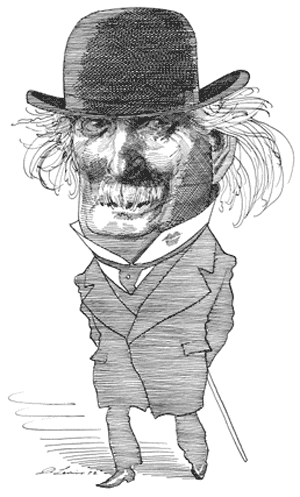In his Preface to these diaries, A. J. P. Taylor remarks that Lloyd George was called the Welsh Wizard by his admirers and the Goat by those who mistrusted him. It may be so. Taylor is the doyen of modern British history and no one is better able to distinguish fact from legend. But I was brought up to believe that just as Asquith’s enemies called him Squiff because he was so often squiffy, or tipsy, in the evening, so Lloyd George’s enemies called him the Goat in their disgust with (or envy of) his inexhaustible sexual appetite.
His elder son’s memories of his boyhood were those of constant rows between Lloyd George and his wife over his affairs with women, some of which as a small boy his son inconveniently observed. There was the episode in Buenos Aires when he had to shave off his moustache to throw his pursuers, friends of an outraged husband, off the trail. According to his son, his political career was three times on the point of explosion. At the very beginning, when he stood for the first time for Parliament, it became known that he had got a young widow with child in Caernavon and an annuity for the child had to be hastily arranged to preserve silence. The second occasion was in 1897 when he was again accused of fathering a child on a young wife in Wales but was able to prove that on the night in question he was in the House of Commons.
The third, and worst of all, was when as Chancellor of the Exchequer he had to bring two suits for libel to defend himself against a charge of adultery. He won by persuading his wife to appear publicly with him in court to stand by him, but only after he had sworn to her never again to humiliate her in this way.
He never did in that particular way. But the affairs went on, conducted with the recklessness that was characteristic of his political behavior. He was a womanizer on a Gargantuan scale. In political warfare his charm was notorious for persuading people to do what he wanted while not incurring in his own mind any obligation toward them. Others, impervious to charm, he could fascinate so that against their will they found themselves complying with his; and when that failed he was the master of every political trick and stratagem to defeat the intransigent.
In sexual warfare he deployed the same tactics. When he was young he enjoyed conquest preferably of “deep” or “interesting” women, as he put it; but in the years of his success and decline he demanded endless variety. It was said that he used to have the typists in the lunch hour, and his family, by now estranged from him, were enraged by his treatment of their mother from whom he was separated, and depicted him as surrounded by a seraglio supported by his political fund which he had dishonestly, but legally, converted to his own use.
In this situation there was one stable element, although more than anyone else she was responsible for the break with his family. In 1911 Frances Stevenson was employed to coach his son Megan Lloyd George during the holidays. Next year Lloyd George asked her to become his secretary at the Treasury, where he was Chancellor of the Exchequer, on one condition: that she become his mistress. She pondered. She accepted; and lived as such until 1943 when, two years after his wife had died and he was eighty, they married. She doted on him, learned how to manage him, and he found her indispensable and treated her with tenderness and imagination, prima donna though he always remained. It would be facile to see Frances Stevenson as an Ann Veronica. But in fact she was no Wellsian heroine, and the judgments she makes in her diaries are conventional.
Still, she was a girl of spirit and, rare among girls of her age and class, she was educated. She got her degree at London University, she spoke French, and she was able to move with ease among the politicians and within the Establishment, which Lloyd George’s wife (who she said had a genius for making any house uncomfortable) never learned to do. Her diaries show that she was not only intelligent but full of vitality, good at a party, mad about dancing at the Majestic in Paris during the peace treaty months, fabulously hard-working and competent, a peerless secretary.
Precisely because the relationship meant so much to him, Lloyd George saw to it that they conducted themselves circumspectly. It is an error to imagine that either the left or the right in Britain is magnanimous toward personal indiscretions: if a chink shows in the armor, they will hack a way through if humanly possible. Only fear that their own chiefs might be similarly embarrassed produces what some mistakenly regard as worldly tolerance. If Lloyd George’s opponents could have caught him out either with women or with share-dealing, as in the Marconi scandal, they would have broken him without mercy. But as long as his wife did not bring suit, he could do as he chose, provided he never flaunted the affair or imagined that he was striking a blow for true love.
Advertisement
This he was singularly unlikely to do. When in the Thirties an old Liberal supporter fighting a seat sent a message to Lloyd George asking whether, even though the country had overwhelmingly declared for protection, he should keep his free trade principles, the ex-premier replied, “Ask him whether he wants to get to heaven or to Westminster.” Like other wise mistresses, Frances Stevenson settled for what she could get and never tried to reform her famous lover.
To anyone who enjoys political gossip the diaries are obsessive reading. But they are not deep. Occasionally one comes across one of those percipient insights which made Lloyd George so much more interesting than his contemporaries in the House. Listening in 1919 to some Negroes singing: “D says it is very significant—the songs about the oppressed people. He says a race who can sing songs will cause trouble one of these days.” But any book about Lloyd George in the end provokes the reader to ask whether it helps to answer the riddle about the man.
The riddle is posed in the form of a paradox. Lloyd George was a genuine radical, the first ever to gain real power in English politics. He hated the landed aristocracy, upper-class insolence and incompetence, all Anglican clergymen and their pretense to be the mouthpiece of God to the whole nation. He stood up for all small men oppressed by large organizations and even in his days of power he never abandoned these prejudices. Yet when he fell from power it was the landed aristocracy who stuck by him to the end, it was the great buccaneers such as F. E. Smith and Churchill with whom he found himself in easy partnership—with their delight in the exercise of power and contempt for constitutional niceties.
The liberal intellectuals whom he had carried with him before the war by his social insurance policies now loathed him as the author of an unjust peace, the corruptor of political life, the ruthless oppressor of the Irish and other minorities and of organized labor. He was a pacifist who opposed the imperialist Boer War, yet prosecuted the First World War to the end, opposing a compromise peace. He had a position, but no principles, no scruples, and no heart. Keynes wrote of him:
Lloyd George is rooted in nothing: he is void and without content: he lives and feeds on his immediate surroundings: he is an instrument and a player at the same time which plays on the company and is played on by them too…a vampire and a medium in one…. One catches in his company that flavor of final purposelessness, inner irresponsibility, existence outside or away from our Saxon good and evil, mixed with cunning, remorselessness, love of power….
Yet it is hard to deny that he was an authentic political genius, in his years of power superior to Roosevelt or Churchill, the architect of victory in the war and of a settlement in Europe and Ireland, and of the woman’s suffrage question.
The riddle has dozens of answers: the split in the Liberal party; the emotional exhaustion after an appalling war which made men opt for safe, rather than for bold, government; the rise of the Labour party and the syndicalism of the trade union movement which made it impossible for Lloyd George to turn left; his own self-corruption which withered his roots and cut him off from the working-class movement. But there is one answer which most uncomfortably rises to the surface in the pages of these diaries, three-quarters of which cover the years of Lloyd George’s zenith from 1914-1922.
No British radical can fight a war successfully, or even, perhaps, direct affairs in times of adversity for any length of time, and still retain the confidence of the left—indeed remain a man of the left. If he sticks to his principles, he is likely to be a weak prime minister and to lose the war, or at any rate to show little sign of winning it—as happened to the Liberal Asquith. If, on the other hand, like Lloyd George, he takes every department which he controls by the scruff of the neck and forces it, and eventually the whole government machine, to become more efficient, he becomes so much a part of the machine that he embodies the very authoritarianism which it is the duty of every radical to attack.
Advertisement
Lloyd George fought the generals and their strategy in order to minimize the slaughter, but the war dead were hung like an albatross around his neck. He found a solution to the Irish problem, but the executions and the Black and Tans dirtied his name. The very brilliance of his feats of negotiation at Versailles destroyed his credibility as a negotiator with organized labor at home. By 1922, when he fell from power never to regain it, nobody believed that he stood by that part of the population whose interests he had once defended, or that he wanted anything more than a blank check to go on exercising power. Power, and the need to come to terms with circumstances, many of which were beyond his or anyone else’s control, had robbed him of credibility. The radical had been devoured by the operator. Perhaps the pattern is inevitable.
This Issue
February 10, 1972




